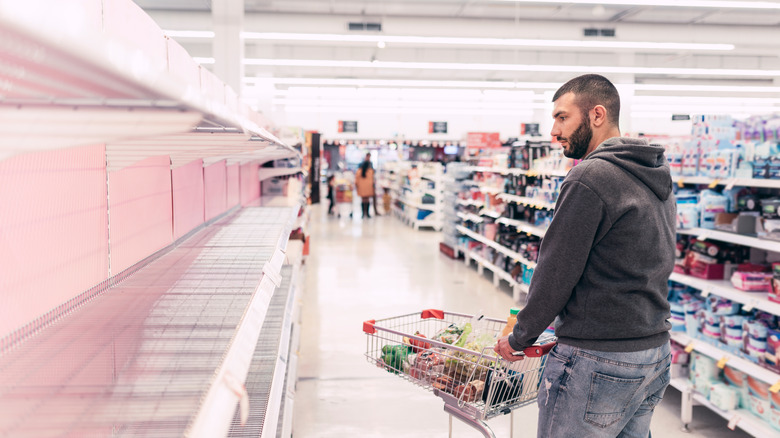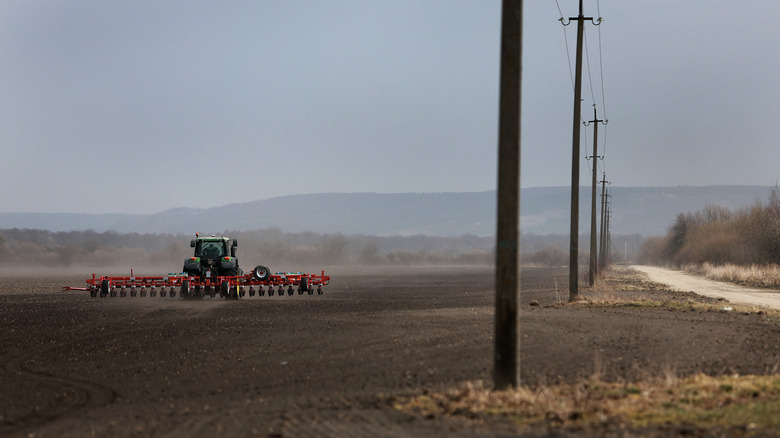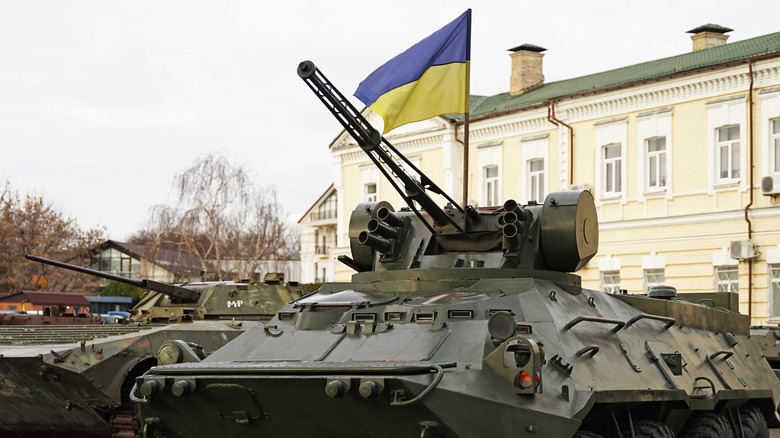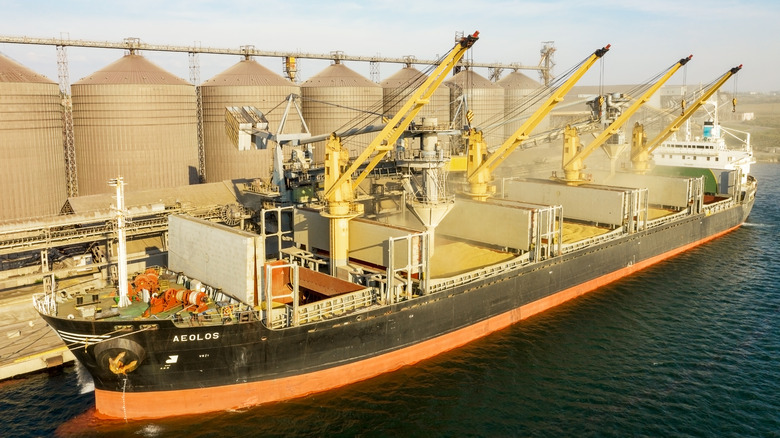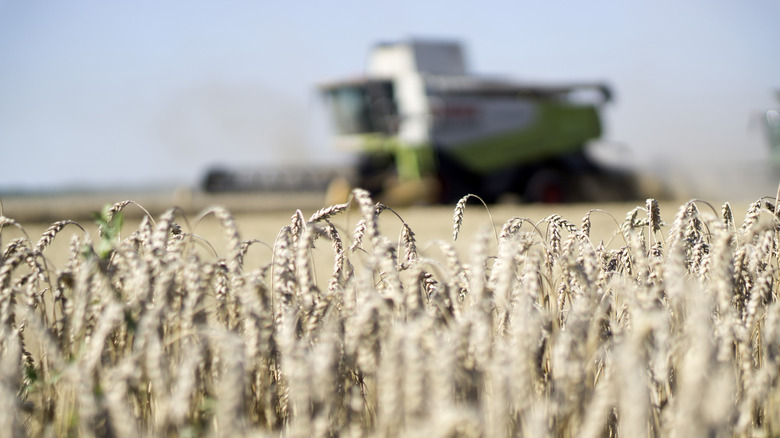What We Know About The UN's Dire Food Shortage Warning
Throughout our lifetimes, the majority of Western consumers have benefited from plentiful supplies of food from around the world, so much so that we have grown used to the ready availability of anything and everything, in both abundance and options. But while we are faced with such limitless choice and instant convenience, it is true that we have become more ignorant as to where our food comes from. When discourse around Western food supplies and our dietary trends does arise, it tends to be a critique of overproduction and overconsumption, with repercussions for the climate crisis and for public health (via The Guardian).
For most people, it is inconceivable that the industrialized Western world could ever be facing widespread food shortages. But on May 12, David Beasley, head of the United Nations World Food Programme, gave a press conference warning the world is facing imminent food shortages. Beasley claimed that the effects of the shortage could be felt as soon as 2023, and that it could lead to mass starvation and millions of people around the world dying of hunger (via The Wall Street Journal).
The reason? The ongoing war in Ukraine.
Why is the war in Ukraine causing a food shortage?
That a war that has thus far lasted just a few months within a single country could destabilize food supply chains throughout the world might sound unbelievable at first, but the importance of Ukraine as a world's leading agricultural producer and exporter cannot be overstated. CNN notes that the United Nations puts the proportion of grain produced by both Russia and Ukraine somewhere in the region of 6% of the world's total, but 16% of the world's production of cereal, from which many food staples are derived, including pasta and corn syrup. Cereals are also used worldwide to supplement the feed of livestock, meaning that they are a vital component in the production of meat and dairy.
According to The Financial Times, Ukraine, which is known as the "breadbasket of Europe," also produces around a third of the world's sunflower oil, an ingredient in countless foodstuffs which is also essential in the fast food and restaurant sector. Now, the production of these vital commodities, which Ukrainian farmers have grown and exported for generations, has been brought to a halt by the conflict.
The situation on the ground
In recent months, many news outlets have revealed details of life for farmers in war-torn Ukraine, shedding light on how the ongoing fighting is affecting one of the world's most important food-producing nations and the many factors that have destroyed the agricultural sector on which the world depends. As reported by The New York Times, Ukrainians who have dedicated their lives to their farms are feeling the force of Russian aggression. Many farms have been hit by shells, destroying buildings and vital agricultural equipment such as tractors, and laying waste to vast quantities of food. "In one word, it was destruction ... Everything was destroyed into pieces," farmer Yuriy Gumanenko told the newspaper.
Many farmers have lost their lives in missile strikes, or been left badly maimed and unable to continue planting, harvesting, and rearing livestock. Other farms that have thus far avoided direct attacks have been left severely shorthanded, with many working farmers having downed tools and taken up arms as part of the Ukrainian military resistance.
Exports blocked
But it's not just chaos on the ground that is destabilizing Ukraine's agriculture. The Russian military has made definite steps to ensure that food that is grown in the country never reaches its intended markets.
As reported in Fortune, many millions of tons of food produced in Ukraine every year are exported through Odesa (pictured in 2021), a port city in the southwest of the country on the Black Sea. Since the conflict in Ukraine began, Russian forces have purposefully blockaded Odesa, meaning that exports of grains, cereals, and other harvests have ground to a halt. On May 6, Fortune claimed that around 25 million tons of grain were trapped in storage in Ukraine, unable to pass through Odesa.
For now, Ukrainian farmers are continuing to grow and harvest what they can, but the blockade means that an unimaginable amount of valuable produce may go to waste, causing a shortage of food, driving up food prices, and decimating farmers' livelihoods. Per NPR, experts believe that Ukraine is due to lose half of its GDP by the end of the year. As reported by Euronews, the Ukrainian government has also imposed a ban on many food exports, to ensure there are enough supplies to feed its under siege population.
How dire is it?
The Food and Agriculture Organization of the United Nations reported in their food price index that food costs reached a record high in March, the month after the conflict in Ukraine first began, meaning that the cost of food is now at its highest point since the index was first created in 1990.
According to Fortune, March was also the month that the UN warned that if the conflict were to continue for a prolonged period, world food prices could jump by as much as 20% on average. In the months that followed, many consumers have felt the pinch of rising food costs, with many stores and supermarkets publicly announcing that they can no longer sustain low in-store prices. Coupled with rising fuel costs arising from sanctions and energy bans imposed on Russia by many governments as a response to the war in Ukraine, and the unavailability of the Russian fertilizer upon which many farmers around the world depend, the spiraling cost of living threatens to push many low-income families into poverty.
Per the same source, the situation is especially shocking in sub-Saharan Africa and the Sahel, where an estimated 43 million are already suffering from malnutrition, as well as in several Middle Eastern countries such as Yemen and Lebanon, where food prices have shot up by between 30% and 50%.
What can be done?
On May 10, the World Food Programme's David Beasley pleaded for an end to the block on Ukrainian food exports, stating: "I urge all parties involved to allow this food to get out of Ukraine to where it's desperately needed so we can avert the looming threat of famine," per Fortune. Beasley's comments occurred as the news broke that Ukraine was attempting to partner with the nearby countries of Lithuania, Latvia, and Poland, to attempt to establish new supply lines that could help to overcome the Russian blockade at Odesa and potentially release 25 million tons of grain and 12 million tons of wheat into the global market.
According to CNN, those further down the supply chain are also looking for their own solutions to tackle shortages. These include diversifying their supply chains so that Ukrainian products such as sunflower oil are replaced with oils sourced from elsewhere. The same source notes that governments have several options to help alleviate the increased cost of food for ordinary people, including establishing new benefit plans, releasing food reserves, and implementing measures to curb food waste. But for now, experts warn (per ABC News) that the current crisis means the world is likely to experience the worst food crisis since World War II.
